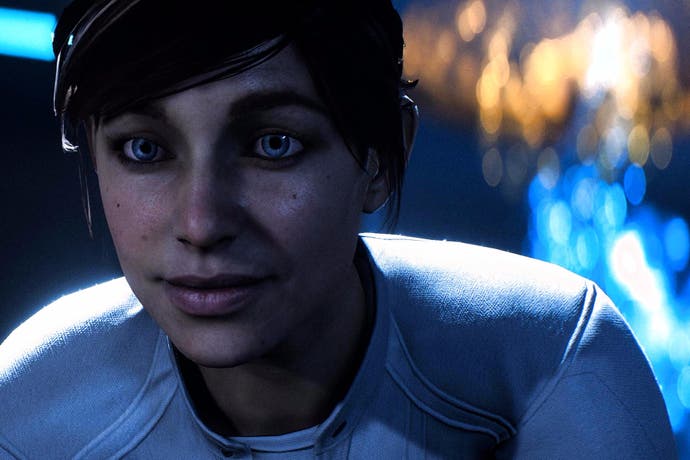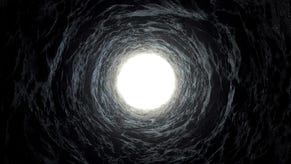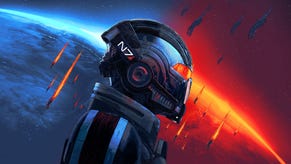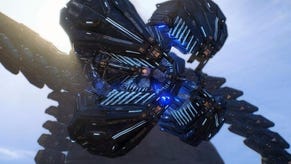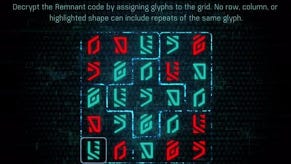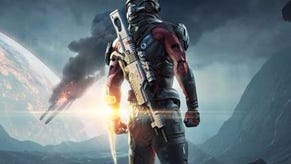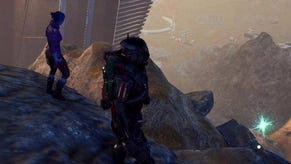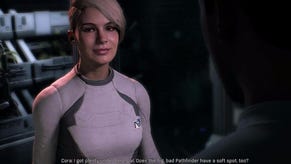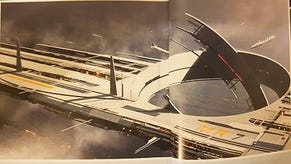Four hours with Mass Effect Andromeda
Far more than just Dragon Age Inquisition in space.
Mass Effect Andromeda has been in development almost five years but it's not until now, one month before release, that BioWare has let us play it. To say some fans are cautious is an understatement. Conspiracy theories abound as to Andromeda's shortened marketing cycle, or the reason why its release date was only set in stone last month. A product of BioWare's untested Montreal studio (albeit with help from the Edmonton mothership), Andromeda has been the subject of concerns over its lengthy development - not to mention the narrative leaps needed to continue the series after its original trilogy was so definitively tied off. And, while Dragon Age: Inquisition was generally well-received, Mass Effect fans want a proper Mass Effect game - not just a Frostbite-powered Hinterlands in space. Recently, fan suspicion bubbled over when a gameplay trailer included a small animation bug. BioWare's fans are some of the most loyal - but also some of the most critical.
Within its first mission, Andromeda sets most fears straight. The game's opening sequence wastes little time propelling you to your new galactic home, introducing core characters and redshirts and immediately placing you under threat. You are Ryder, the son or daughter of humanity's Pathfinder leader, in a brand new galaxy on a ship full of tens of thousands of colonists - most still in cryosleep. But Andromeda is immediately more alien and hostile than you were expecting. Within minutes, you find yourself almost alone on a completely foreign world.
The move to Andromeda is a smart one: it both sidesteps the narrative dead end BioWare had written itself with Mass Effect 3 (Andromeda's colonists leave just before ME3 begins) and acts as a natural refresh for the series' space opera storyline. Many of the players remain the same - turians, krogan, salarians, asari - but each species is now the invader, the alien, the stranger. Past events are still important to the identity of each race, but I was surprised how quickly Andromeda created its own conflicts. After all, every colonist leaving the Milky Way opted in to their one-way ticket. It's a great backdrop for Andromeda's characters, but also a fine stage for divisions immediately upon arrival when things don't go to plan.
That first planet you find yourself on treats you to a taster of this trouble. Andromeda's Heleus Cluster is not the welcoming harbour you were expecting, or even particularly safe for the locals. Quickly you're introduced to several new races - the invading kett, and later the indigenous angara. Then there's an ancient synthetic race known as the Remnant. Each presents a new challenge - to befriend, to fight against, or simply to try and understand. It's a familiar theme - after all, the original Mass Effect trilogy was set against the story of humanity's growth on an already-mature galactic stage. Andromeda takes that idea to the extreme - here, humanity is now a minutes-old arrival, and the galactic stage is a mess.
It's lucky, then, that when you do need to pull out a weapon, BioWare has used Mass Effect's move to Frostbite to beef up its combat. Much has been made of the decision to ditch the series' traditional character classes (although stat-boosting Profiles with similar names are unlocked when you specialise in a relevant field). So, if you want, you can now be a biotic engineer with soldier skills who wields a massive krogan hammer, and when you become Pathfinder you can switch between Profiles on the fly. Another big change is Andromeda's move to dynamic cover, which takes a little getting used to - initially it feels imprecise compared to ME3's snap to cover feature, but the shift to more varied terrain means it comes in handy. One big negative, however, is the removal of the powers wheel, and with it the ability to command squadmates to use specific abilities. (I asked producer Fabrice Condominas for more information on why the powers wheel was removed, which you can read in our separate discussion). Overall, combat is saved by Andromeda's addition of new movement options - a boost jump, a further boost via horizontal jets and automatic mantling. It means you can hover above the battlefield and shoot down over cover, or boost up to the top of a building and snipe down with ease. It's faster and more fluid than any Mass Effect so far.

Frostbite's larger areas appear even in "critical path" narrative missions. Andromeda's prologue is a good example. Here you're tasked with a perilous descent down cliffs while lightning strikes around you - a good place to try out that boost jet. There's a key goal you must reach, but on the way there are diversions - other paths and distractions. Caves hold encampments of kett but also valuable loot. Another path lets you free a grateful survivor. Later missions are even more open, although BioWare has shied away from describing the game as open-world. The planet Kadara, seen in BioWare's earlier cinematic trailer, hosts one of the game's many hubs. There's a critical mission here, but you'll likely spend much longer getting to know the locals, trading items and uncovering side-quests. The area's market hub sees Ryder in shirtsleeves, free to wander even while undertaking the main story. You can go meet Sloane Kelly, one of the ex-Andromeda Initiative officers who has defected, and watch that scene with the graphics bug which has now been re-animated. Or you can visit a local bar, or uncover a serial killer, or search for a hidden cache of supplies out beyond the market, in an area where you switch to your armour and rev up the six-wheel Nomad.
I'm not yet sold on the Nomad, I have to admit, but Kadara's drivable area was fairly compact and I was in somewhat of a hurry to see as much as possible, so used the game's fast-travel option when specific points became unlocked. Right now the best I can say is that the Nomad handles better than ME1's Mako and its on-board robo-mining function is better than ME2's planet-scanning. Exploring in general is fun but with far wider environments than Inquisition there feels like there's less finesse in certain areas, as much of it is designed to be rushed through. At least navigation and quest-tracking is improved - Andromeda has both ME3's annotated top-down map for each area or hub as well as ME1 and 2's much-missed full quest log. Another handy feature comes after completing a mission, when you can look back over a summary of what happened and see how you responded to any choices. I didn't get to see any game-changing decisions, but regular dialogue felt more open thanks to the expanded selection of responses. You can now choose either an emotional, logical, casual, or professional response in many instances where you previously just had a Paragon/Renegade option. As for the game's animation, in most cases it is generally fine, albeit on the baseline of a BioWare role-player with hundreds of thousands of possible lines, rather than a Naughty Dog game with a static script.
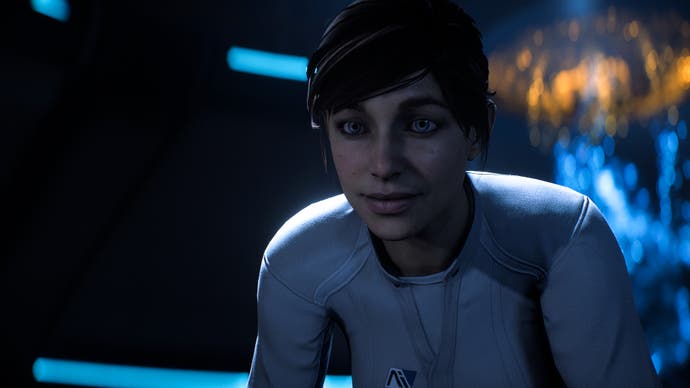
But cars, combat, even exploration - for me, none of this matters at all if Andromeda's cast wasn't worth making the journey with. Mass Effect's heart has always been its characters. Sure, the trilogy was technically about stopping the Reapers, but the people and aliens you met over those three games were the aspect fans remembered, mourned and missed when all was said and done. Andromeda features six new squadmates and another four crew members aboard your ship, the Tempest, which is sleeker, brighter and more homely than the Normandy. Every character on board has their own personality and perspective. Exploring the ship while everyone was still settling in, I was treated to scenes where Ryder hung out with the crew, or where I stumbled upon them mid-conversation with others. In general, Andromeda's tone is a little brighter than the grim circumstances of ME3, though moments of your main mission can still carry some serious narrative weight. It's your little family of crewmates who signed up for adventure which provide light-relief. The interaction between them picks up the tone from where ME3 and its Citadel DLC left off - well-written, well-rounded and instantly likable. That's not to say they're all going to be best friends - early on, different opinions among the diverse cast were plain to see. Securing one squadmate's trust may impact another, I was told by Condominas, and some players may find themselves unable to complete every character's loyalty mission.
The game's aliens once again steal the show and, while different to your squadmates of old, comparisons to past party members are inevitable. Take Krogan badass Drack, for example - an ancient, wizened warlord but still capable of smacking enemy heads together. He provides the gravel-voiced deadpan humour of Wrex but from a more mature point of view, almost the antithesis of Grunt. By comparison, turian squadmate Vetra seems much younger. She's warmer than Garrus - if anything, she seems closer to Tali - and protective of her little sister who also made the jump to Andromeda. Then there's Peebee, your new asari pal - adventurous, sometimes spiky, she lives in one of the Tempest's escape pods. My early favourite is Jaal, your new squadmate from Andromeda's angara race. His background provides a window into that culture and its factions in a way which reminds me of Javik from ME3 - and he's also got a lot of fans very hot under the collar. (It goes without saying that yes, you can try to flirt with everybody.)
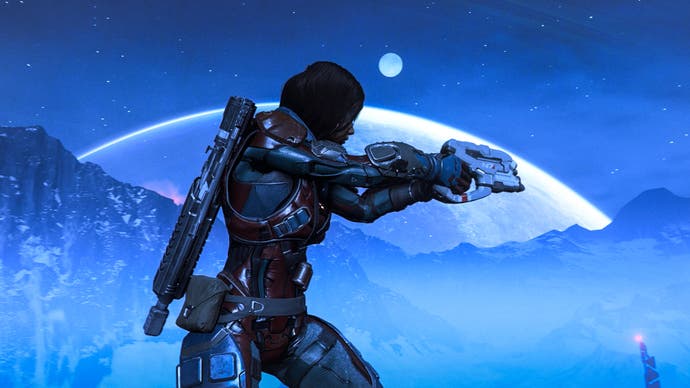
Liam and Cora are your human squadmates, meanwhile, who are with you right from the start. Liam is a cockney, cool, upbeat and a natural fit for the role of your new best bro - I checked in on him in his quarters and had a short scene where we shared a beer. Cora is stricter, trained to be your senior but now having to deal with the fact this is no longer the case. Both are a million times better than Ashley and Kaidan. Elsewhere on your ship you'll find salarian pilot Kallo Jath, asari doctor Lexi T'Perro (voiced by Game of Thrones' Natalie Dormer), Scottish science officer Suvi, and chief engineer Gil Brodie, who very much enjoyed my male Ryder's flirting. Finally, there's SAM, your new AI who on the surface seems similar to EDI but in reality is far more intriguing. SAM was created by Ryder's parents - and, it is hinted, will help uncover more of your family's backstory. Your father Alec Ryder, voiced by Clancy Brown, is more distant - a useful narrative trick when the player initially feels little connection to him.
After more than four hours of playtime I left Andromeda feeling like I had barely brushed an omni-tool over its surface. Crucially, though, it felt convincingly like a Mass Effect game. I enjoyed Dragon Age Inquisition, but after five years of waiting for a new Mass Effect chapter and a fresh start for the series overall, BioWare needed to do more than just transpose its Frostbite template for fantasy gameplay into the sci-fi genre. Andromeda's combat, characters and stories thankfully hold up.
And, excitingly, much of Andromeda remains a mystery. I got a glimpse at a couple of spoilery moments in the game's early plot but its overall storyline is still shrouded in secrecy. (And you can click here to read more than a dozen other, more nerdy bits of Mass Effect Andromeda information I couldn't squeeze into this preview). I'm curious what happened to the Andromeda Initiative's other arcs, to find out about all the new factions I met. I still have no idea about the Remnant race or its creators and I'm intrigued by Ryder's own family story. I'm also itching to experiment properly with the game's combat - and even to try out the game's co-operative multiplayer mode, which we were not able to sample. But, most of all, I want to spend more time with its characters - and simply see where this new adventure takes us. And that, to me, sounds a lot like Mass Effect.
